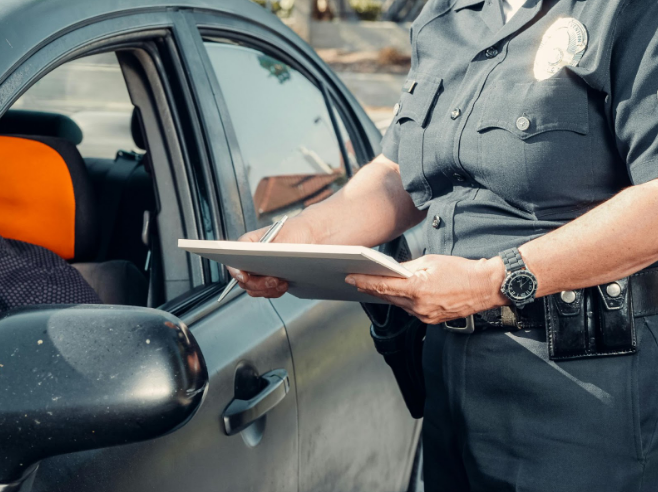Do you know that thousands of people fall victim to DMV fraud yearly? According to a Thomson Reuters report, suspicious activities (SARs) related to fraud increased by 4% to 5% in 2024. This concern is valid, especially when personal information and public safety are at risk when scams target the Department of Motor Vehicles (DMV).
To avoid such situations and to protect yourself from identity theft or false legal accusations—such as someone using a vehicle registered in your name for illegal activities—it’s important to understand what DMV fraud is. In this post, we will explain DMV fraud, its most common types, warning signs to look out for, and its potential consequences.
Need support after a scam? Join our community today.
What Is DMV Fraud?
Department of Motor Vehicles (DMV) fraud is a series of illegal activities that manipulate the DMV’s processes and services. These schemes are often used to gain illegal benefits or privileges, such as obtaining a driver’s license, vehicle registration, or other DMV services through dishonest methods.
What Are the Common Types of DMV Fraud?
DMV fraud can take many forms, each with its level of severity and specific characteristics, even under well-known fraudulent schemes such as phishing. Here, we explain the most common types of DMV fraud so you can understand how each scheme works:
1. Document Falsification
This includes creating or altering documents such as birth certificates, utility bills, and other proof of residency or identity to trick DMV officials. Fraudsters use these falsified documents to meet the requirements for fraudulently obtaining a driver’s license or vehicle registration.
- Example: Submitting a fake utility bill to falsely prove residency in a specific state.
2. Identity Fraud
This type of DMV fraud occurs when someone uses another person’s identity—or creates a completely fake identity—to apply for DMV services. It may involve taking a driver’s test, applying for a driver’s license, or registering a vehicle under someone else’s name.
- Example: Using a stolen Social Security number to obtain a driver’s license in another state.
3. Corruption at DMV Offices
Some cases of DMV fraud involve corrupt employees who might illegally issue documents such as driver’s licenses and vehicle titles, manipulate test results, or alter records in exchange for cash payments. This internal corruption weakens the DMV’s integrity and can compromise public safety.
- Example: A DMV employee accepting money to issue a driver’s license without requiring the applicant to take the test.
4. Title Washing and VIN Fraud
Vehicles with a salvage or damage history often have their titles “washed” to remove any record of past issues, making them appear clean. On the other hand, VIN (Vehicle Identification Number) fraud involves altering or cloning VIN’s to hide a vehicle’s history, such as theft or severe damage.
- Example: Replacing a car’s VIN plate with one from a legally registered vehicle to deny that it was stolen.
- Example: Altering a salvage title to make the car appear in good condition, increasing its resale value.
5. Title Jumping
This type of car dealership fraud happens when a vehicle is sold without transferring the title to the new owner’s name. In many cases, sellers—whether dealers or private individuals—use this tactic to avoid paying taxes. Additionally, they may rely on this method to conceal the vehicle’s history, such as prior accidents or mechanical issues.
As a result, skipping the title transfer not only helps them evade taxes but also shields them from legal responsibility for the vehicle.
- Example: A private seller flipping cars by skipping the title transfer to avoid paying sales taxes.
Have questions about dealing with scams? Contact us for support.
How Can You Identify DMV Fraud?
DMV fraud can often be subtle and difficult to detect. However, recognizing certain warning signs can help you protect your personal information and avoid becoming a victim. Here are some common warning signs that may indicate DMV-related fraud:
1. Inconsistencies in Documentation
If you receive DMV documents with errors or inconsistencies, such as incorrect personal details or vehicle information, be extra careful. These issues could indicate that someone is attempting to use your identity or has interfered with official records.
- Example Message: “Dear [Your Name], your 2020 Toyota Camry is due for registration renewal. Please confirm your payment details here.” However, you own a Honda Accord.
2. Unusual Requests for Personal Information
The DMV does not request personal information via unsolicited emails or text messages. Be suspicious of communications asking for sensitive details such as your Social Security number, driver’s license information, or banking details without a verified reason.
- Example Message: “To complete your DMV records update, please reply with your Social Security number and the full details of your current address.”
3. Unauthorized Transactions Involving Your Vehicle
Be alert to unauthorized or unexpected changes related to your vehicle’s registration or title. Emails or calls about payments you don’t recognize or changes in ownership that you did not approve could suggest fraudulent activity.
- Example Message: “Thank you for your payment of $230 for the vehicle registration fee. Click here to view your transaction receipt.” When you haven’t made any recent DMV payments.
4. Phishing Attempts
Scammers often impersonate the DMV through fake emails or text messages. These messages may ask you to click on a link, share personal information, or resolve supposed issues with your driver’s license or vehicle registration.
- Example Message: “URGENT: Your driver’s license is pending suspension. Immediate action is required. Prevent this by verifying your identity now at [Fake DMV Link].”
5. Pressure Tactics
Scammers frequently create a sense of urgency to push victims into quick decisions. Claims that immediate action is necessary to avoid penalties, legal action, or license suspension are common tactics.
- Example Message: “To avoid legal action, you must resolve your unpaid DMV fees within 24 hours. Call us immediately at [Phone Number] or pay directly through [Suspicious Link]”.
How Can DMV Fraud Affect Your Life: 3 Consequences
DMV fraud can have far-reaching consequences that may impact your daily life, including the potential loss of your driver’s license and the inability to legally operate a vehicle. Below are some of the most common and serious consequences of DMV fraud:
1. Financial Loss
Victims of DMV fraud often face unexpected fines, fees, or the cost of resolving fraudulent activities committed in their name. In severe cases, these financial consequences can lead to personal expenses, such as legal fees, fines, or lost wages due to time spent clearing fraudulent records.
- Example: A person receives a notice for unpaid parking tickets associated with a vehicle registered in their name—one they don’t own. Resolving these fraudulent charges might involve paying legal fees, contesting fines, and spending weeks navigating DMV regulatory processes.
2. Legal and Penal Issues
Both participating in and falling victim to DMV fraud can end up with serious legal consequences. Depending on the type and severity of the fraud, penalties may range from misdemeanors to felonies and could include probation, fines, or even jail time.
- Example: In California, vehicle registration fraud can result in fines of up to $10,000 or imprisonment, depending on whether the case is treated as a misdemeanor or a felony.
3. Long-Term Effects on Vehicle Registration and Licensing
DMV fraud can create lasting problems with vehicle ownership and licensing. Victims may struggle with transferring titles, updating vehicle records, or maintaining a valid driver’s license. These challenges can also affect related areas, such as credit scores or insurance premiums.
- Example: If someone illegally obtains a driver’s license in your name and commits traffic violations, the resulting points could increase your insurance premiums or even lead to license suspension. Such issues can negatively affect your ability to drive legally.
Get the Support You Need to Prevent DMV Fraud
DMV fraud can happen to anyone, especially because many people are unaware of application procedures or fall victim to impersonation scams. The best solution is to stay informed, regularly review your official documents—such as licenses and vehicle registrations—and report quickly if you notice any discrepancies.
At the Cryptoscam Defense Network (CDN), we share information about the latest fraud and scam techniques across various areas. Additionally, we offer a supportive community where members can share experiences, receive guidance, and alert others to potential threats.
We Want to Hear From You!
Fraud recovery is hard, but you don’t have to do it alone. Our community is here to help you share, learn, and protect yourself from future frauds.
Why Join Us?
- Community support: Share your experiences with people who understand.
- Useful resources: Learn from our tools and guides to prevent fraud.
- Safe space: A welcoming place to share your story and receive support.
Find the help you need. Join our Facebook group or contact us directly.
Be a part of the change. Your story matters.
Photos via Freepik.







